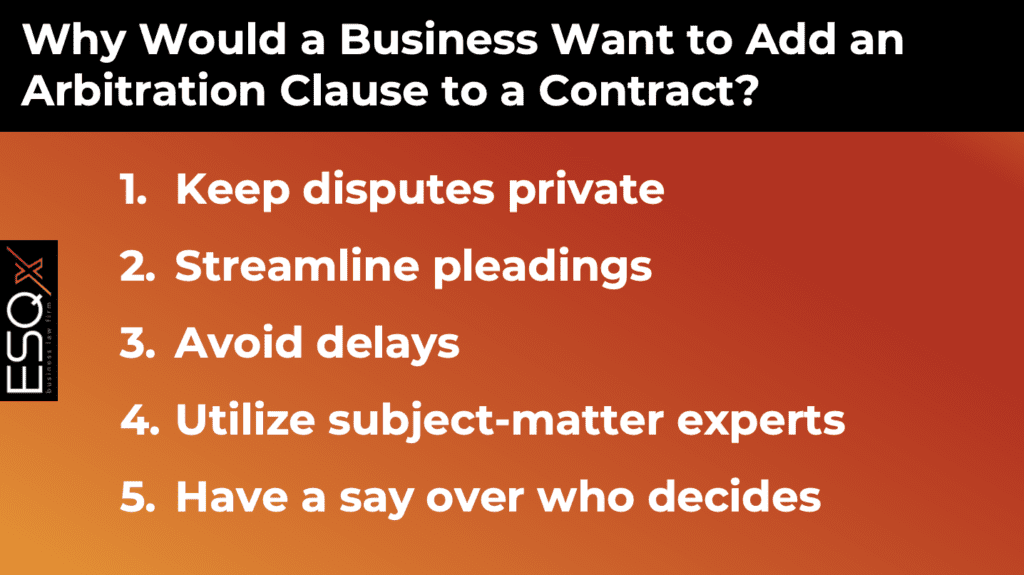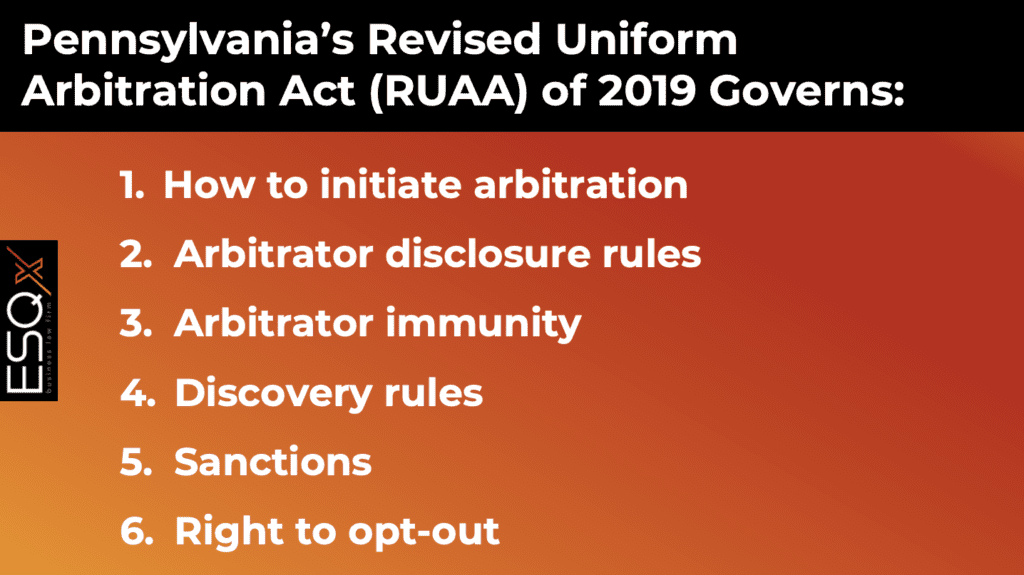Arbitration lets parties resolve a dispute without a judge or jury present. Often, small businesses will choose to take a matter to arbitration instead of the public courts. In Pennsylvania, there are two main types of arbitration:
- Compulsory, or through the courts.
- Contractual, or outside the courts.
For our purposes, we will review the concept of arbitration by agreement. Arbitration in this manner occurs when the parties to a contract agree, in the event of a dispute, to have their dispute resolved by an independent third party arbitrator who the parties privately hire. Also, keep in mind that arbitration is different from mediation. Mediation is a formalized process of negotiation, where the mediator will spend time listening to each party’s positions to try to broker an immediate settlement. However, unlike arbitration, the result is not binding on the parties. Arbitration starts when the drafting party inserts a contract clause providing that all disputes must be handled “in arbitration” or, on occasion “AAA Arbitration,” which refers to the American Arbitration Association, a non-profit organization which provides services to individuals and organizations who seek to resolve matters outside of court. The AAA is able to administer arbitration proceedings, as well as provide guidance on best practices.
If you want to keep your contract disputes private, an arbitration clause may be a good fit for you.
Advantages of Arbitration
As an entrepreneur, there are many reasons why you would draft a contract with an arbitration clause. Generally, parties to a contract like arbitration because it’s a way to keep disputes private and outside the courts (and the public eye). This is a common contractual tactic used when one of the parties would like to keep a low profile, or protect the integrity of intellectual property, for example. Other reasons include:
- Avoiding time delays that often come with using courts,
- Getting insight from an arbitrator’s unique specialization in a particular domain
- Allowing parties to have a say in choosing the arbitrator
Arbitration proceedings are similar to court, but more simplified and streamlined. The process begins when a party files a claim. Then, the responding party files a formal response. Each side serves formal discovery on each other and depositions may occur. Similar to a judge, the arbitrator may hear motions and compel parties to produce documents or attend a deposition. There is no rule that says these motions must be heard in a physical courtroom. Courts in Pennsylvania have recognized that arbitrators generally have wide latitude to grant any relief they see fit.

Disadvantages of Arbitration
Revised Uniform Arbitration Act (RUAA)
Pennsylvania has a new rule, called the Revised Uniform Arbitration Act (RUAA) which now governs all agreements to arbitrate in Pennsylvania as of 2019. The culmination of this legislation has been brought forth by the immense increase in arbitration clauses over the past twenty years. It addresses issues such as:
- Initiation of Arbitration. Notice must be given in writing or electronic record describing the nature of the controversy and the remedy sought. Moreover, notice must be provided to all parties bound by the arbitration agreement, not only the party against whom a claim is sought.
- Disclosure. To ensure impartiality, an arbitrator must disclose potential biases, such as a financial interest in the outcome or personal contacts to the parties involved.
- Immunity. To encourage the arbitrator’s neutrality, he will have immunity like a publicly elected judge.
- Discovery. RUAA permits discovery “taking into consideration the needs of the parties to the arbitration proceeding and other affected parties and the desirability of making the proceeding fair, expeditious and cost-effective.” Interestingly, RUAA also permits discovery against non-parties even though arbitration is technically private.
- Sanctions. The arbitrator may order sanctions and award punitive damages so long as the arbitrator specifies in the award the basis for the determination.
- The Right to Opt Out. Via the RUAA, the parties may modify or restrict the provisions of the RUAA, with certain exceptions.

Applicability
Enforceability
However, if the contract is unenforceable, you may be able to escape arbitration. In Bair v. Manorcare, the Superior Court of Pennsylvania declined to enforce an arbitration clause, stating that absent “was mutual assent of the parties to the alleged contract.” There may be other situations that rise to a similar level as to invalidate the contract, thus getting you out of arbitration.






